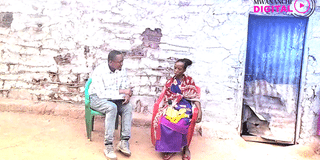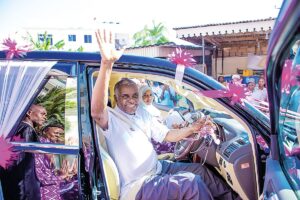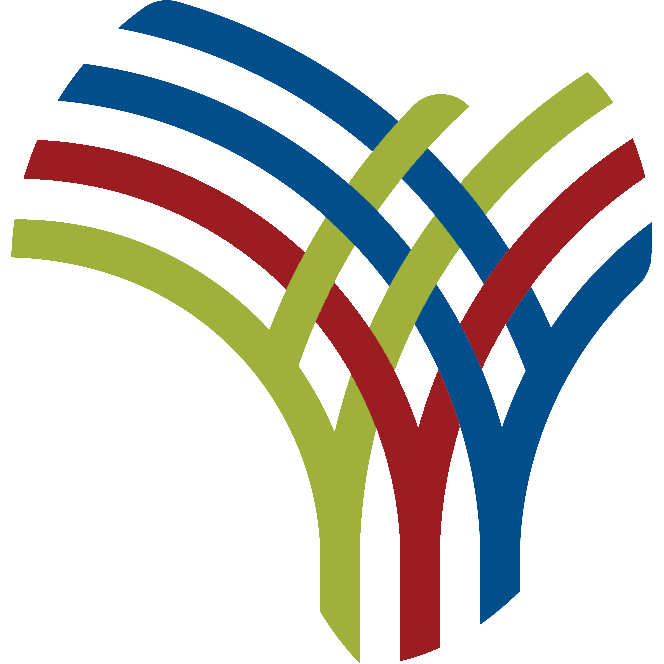Arusha|Manyara. “We had five cows and 10 goats. When the drought worsened, all the cows died and only five goats remained,” said Helena Leiyan, a mother of four children who has been abandoned by her husband since 2021.
Helena, who lives in the village of Terrat in Simanjiro District, Manyara Region, says that as the drought worsened, her husband sold the remaining goats and disappeared.
She added: “Life became harder after he vanished. Before he fled he was working as a labourer on people’s farms and doing other activities, but it wasn’t enough. He had to leave without even saying goodbye.”
“We don’t know if he’s alive or dead, and he never tried to contact us,” added Ms Helena, who is the mother of four sons aged nine, 11, 16, and 17.
Ms Helena says her husband, named Leiyan Nelukendo, left five years ago, in 2019. Since he left, she says she continued to struggle with her children until 2023 when things became difficult, and she decided to seek help from her husband’s relatives, where she currently lives.
“We were two wives; my co-wife and her two children went back to their home after my husband left. I stayed until last year when I came here, and they welcomed me,” she added.
Ms Helena and her children, two of whom were in school at the time, even though it was Saturday because they had exams coming up, were living with Leiyani’s brother named Isaya Nelukendo.
“We’re grateful to have a place to stay, but I also need to have my own farm or livestock. My husband didn’t have these, but if I can get them, I’ll ease the burden of where I’m currently living,” she explained.
We spoke with Isaya Nelukendo, who said: “We’re not sure where he (Leiyan) is; I once heard he’s in Mirerani. This is his family (Helena and her children), so it’s mine too, and I have a responsibility to help them.”
When asked about providing land or livestock to the mother, Mr Nelukendo said he would have done so if he had them, but what they have is not enough.
He added: “We’ll eat what we have according to God’s plan. And they’ll stay here until they can stand on their own.” Men leaving their families is not uncommon in those areas, as this issue also introduced me to a middle-aged mother. She introduces herself as Naitapuaki Lukas in the village of Oloswaki.
Ms Naitapuaki, living with her elderly husband, says: “We had two sons. As they grew up, they left, and we don’t know where they are.”
She believes her sons are in the city. “I don’t know if they’re in Mirerani or Dar es Salaam. They haven’t been in touch with us at all since they left.”
She, along with six other women, agreed, saying it is not just their village; many men have left neighboring villages as well.
Despite this situation, there are men who, despite the hardships, have persevered and engaged in other activities. Here, I met Noah Lukas in the village of Oloswaki, who is engaged in irrigation farming and animal husbandry.
“Animal husbandry has become difficult due to the decrease in grazing land. Although I have a few goats, my main focus is on farming. We’re grateful the government brought water close by. I sell vegetables and can support my family,” said Mr Lukas.
Maasai in the city
In other urban areas such as Dar es Salaam and Zanzibar, there are Maasai people who are known for small businesses, security jobs, and some engage in hairdressing.
In Mwenge area, Dar es Salaam, I met Naranda Saling’o, who runs a small business selling wallets, belts, nail clippers, and fabrics around the neighbourhood. Despite having lived in Dar es Salaam for over seven years since leaving his home, Engarenaibor, in Longido, Arusha, he admits to having lost contact with his relatives due to lack of communication.
“I don’t have a phone,” said the young man, who claims his life hasn’t changed much because the money he earns isn’t enough to sustain himself, including finding a place to sleep.
“When night falls, I’ll sleep anywhere. Even clothes, this is the only one I have, I wash them and wait for them to dry so I can wear them. I shower in rivers and waterways that I consider clean,” he says.
At the age of 25, he has no plans to start a family because he does not have a place to accommodate a partner, and he cannot afford his daily needs. “I have no money, family needs money, I don’t have any. Besides, where would she sleep” he says.
For his part, Mr Joseph Nendukai works as a security guard in one of the buildings in Sinza. He is cheerful and says he came to Dar es Salaam in 2017 to seek a livelihood. “I had 20 cows and 50 goats, but they died, leaving only three calves and 10 goats. There was no grazing land, and some got sick,” said the young man from the Nanja village in Monduli District.
Mr Nendukai says he left his wife and two children back home, under the care of his brother’s homestead, and he communicates with them, helps them, and visits at least once a year or every two years. He added: “Our communities have been greatly affected by drought; many animals died, which is why many of us left home to seek a livelihood to support our families.”
Helena Leiyan, a mother of four who has been abandoned by her husband since 2021, after their life became difficult because their livestock died due to drought
How village leaders receive and resolve cases of climate mobility
The phenomenon of men leaving and abandoning their families is not uncommon in these areas, although leaders say it is not on a large scale.
The chairman of Terrat village, Kone Medukenya, says that the main activities of the villagers in the village are farming and animal husbandry, acknowledging that farming has become more prevalent recently due to the harsh conditions for large-scale animal husbandry.
He says that drought has greatly affected the availability of pasture and the well-being of many households.
“There are many cases we handle related to family disputes caused by the hardship of life, people are struggling to find food and their livestock are dying… some have left and abandoned their families, although not on a large scale.”
The cultural leader of the Maasai tribe, known as Laigwanani Lesira Samburi says there are many cases of people leaving, especially the youth.
“People are fleeing households, especially the youth. You know, life has changed a lot. Despite the presence of drought these days, the lifestyle systems have greatly affected the youth,” he said, pointing out the presence of communication devices and lack of morals among educated youth.
Mr Samburi said many educated youth who are fortunate enough to study often leave and forget where they come from.
“I tell the youth not to forget where they come from; this is their home,” he said.
Regarding men fleeing their households and families due to the hardship of life, the Laigwanani said: “The village committee, in collaboration with close relatives of the husband, discuss the issue, and those without livestock are given a small amount to start with so they can continue to stay with their families.”
Climate change mobility and what expert says
Statistics from the Internal Displacement Monitoring Centre (IDMC) showed that by 2020 severe weather conditions caused over 24 million people to be displaced from their homes, while International Organization for Migration (IOM) estimated that by 2050, the effects of climate change – if significant changes are not made now – will result in millions more people being displaced.
Meanwhile, the Groundswell network predicts that over 216 million people will be displaced, with three out of five being from the African continent. Lecturer at the Center for Climate Change Studies at the University of Dar es Salaam, Professor Pius Yanda, stated that in areas affected by drought, floods, or lacking in animal grazing pastures, people are forced to migrate to other areas.
Professor Yanda emphasised the importance of ensuring that the environments to which people migrate are equipped with infrastructure to support them, thereby preventing conflicts in the areas they move to.
“Projects like BBT ‘Building a Better Tomorrow’ provide significant support, but they need to be expanded to reach more areas. Infrastructure for irrigation and research to support sustainable agriculture are crucial,” he said.
Dr Wessam El Beih from Internal Displacement Monitoring Centre (IDMC) stated that some policies that can protect people at higher risk of displacement involve enhancing resilience and adaptation within rural communities. This can be achieved by facilitating access to basic services, livelihood opportunities, and measures to mitigate the impacts of disasters such as floods and droughts.
Supported by Bill & Melinda Gates Foundation















